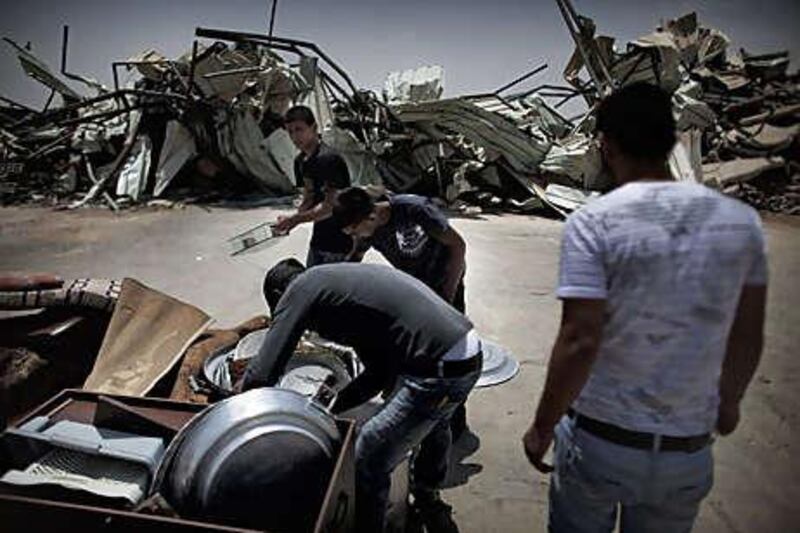AL ARAQIB, NEGEV // Israeli security forces destroyed a Bedouin village this week for the second time in a matter of days, leaving 300 inhabitants homeless again after they and dozens of Jewish and Arab volunteers had begun rebuilding the 45 homes.
Human rights groups warned that these appeared to be the opening shots in a long-threatened campaign by the Israeli government to begin mass forced removals of tens of thousands of Bedouin from their ancestral lands in the southern Negev. The High Follow-Up Committee, the main political body for Israel's Arab minority, vowed this week to help rebuild the village for a second time and said it would call on the UN to investigate Israel's treatment of the Bedouin.
Al Araqib village, which is a few kilometres north of the Negev's main city Beersheva, has become a symbol of the struggle by about 90,000 Bedouin to win recognition for dozens of communities the government claims are built on state land. In a test case before the Israeli courts, an inhabitant of al Araqib has been presenting documents and expert testimony to show his ancestors owned and lived on the village's lands many decades before Israel's establishment in 1948. The judge is expected to rule within months.
"Tearing down an entire village and leaving its inhabitants homeless without exhausting all other options for settling longstanding land claims is outrageous," said Joe Stork, the deputy Middle East director of Human Rights Watch. A force of 1,500 police, including a special riot squad wearing black balaclavas, entered the village early on Wednesday to pull down a dozen wooden shacks and a half-built concrete home. The local Aturi tribe had been in the process of rebuilding the village after it was razed by bulldozers a week earlier.
The Israeli forces also uprooted 850 olive trees, said Ortal Tzabar, a spokeswoman for the government's Land Administration. Yesterday Adalah, a legal group for Israel's 1.3 million Arab citizens, demanded a criminal investigation into what it called "police brutality" during both demolition operations. Sawsan Zaher, a lawyer, said assaults on villagers, confiscation of their property and the security forces' decision to cover their faces and not wear identity tags were all designed to "instil fear" in the residents.
Taleb a-Sanaa, a Bedouin member of the Israeli parliament who was left unconscious on Wednesday after police dragged him from a tent in which he was staging a protest, warned that the government was risking "an uprising in the Negev". Six village leaders were arrested shortly afterwards when they refused to sign a paper committing not to return to al Araqib. Awad Abu Freih, a village spokesman, said they remained defiant. "The authorities want to break our connection to this land so it can be turned over to Jews. They can keep destroying, but we will continue rebuilding. We will not leave."
The first demolition of the village, late last month, came shortly after Prime Minister Benjamin Netanyahu warned his cabinet that the growth of the country's Arab minority, already a fifth of the population, posed a "palpable threat" to the state's Jewishness. "The effect could be that different elements will demand national rights within Israel - for example, in the Negev - if we allow for a region without a Jewish majority."
The Bedouin's increasing assertiveness about their indigenous status, which is backed by international groups, has led to a backlash from officials, who regularly refer to the Bedouin as "squatters" and "invaders" of state land. The government's conflict with the Bedouin dates back to Israel's founding, when most of the Negev's population were driven out of the new state. With the highest birth rate in Israel, the surviving tribes have grown rapidly and now number 180,000, more than a quarter of the Negev's population despite waves of state-sponsored Jewish migration.
Israel has refused to recognise the Bedouin's traditional communities and insists they move into seven deprived townships built by the government several decades ago. Only about half have done so, with the rest insisting on their right to continue with their pastoral way of life. Like 45 other unrecognised villages, al Araqib is deprived of all services, including water and electricity, and its buildings are illegal.
A recent government commission found that tens of thousands of Bedouin buildings are subject to demolition orders, though until now individual buildings have been targeted, not whole communities. Last month the Beersheva planning committee approved a scheme to recognise 13 Bedouin villages and force the other inhabitants into the townships. In that plan, al Araqib's lands are designated for a "peace forest", a move Mr Abu Freih said was designed to prevent the villagers' return.
Ms Baruch said the authorities were demanding the inhabitants move to Rahat, even though no homes were provided for them. Mr Abu Freih said other parts of the tribe's lands nearby had been secretly settled by Jews in 2004.. jcook@thenational.ae






